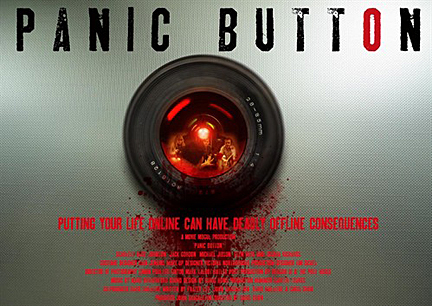
There’s also a lame revenge angle that’s then worked in, which transforms the antagonist from a random person ruining people’s lives with information he’s gotten from the internet into a Jigsaw-esque figure out to make a point and right a perceived wrong. The entire social media aspect is dropped completely in favor for a lame “do this terrible thing or I’ll kill your loved one” schtick that’s been done so many times before. After building this story around a very relatable fear, “Panic Button” takes a sudden nosedive into generic “Saw” ripoff territory for the final act. “Panic Button” starts off by hitting on a very raw nerve and inducing some very real stress in the viewer.īut then it goes nowhere. And of course there’s then the anxiety that arises from the realization that opting out of these services often come at a price and are pretty much essential for contemporary living. And yet, it’s out there and if it gets into the wrong hands, it could be. Even if it’s not something horrible, it’s not something that I’d want to be completely public knowledge. I immediately began to think of stupid tweets that should never have been sent, dumb photos I really wish would totally disappear from Facebook, questions I’ve answered when filling out an online dating profile and began to realize that yeah, there’s a lot out there. I felt myself beginning to wonder what information is out there about me. It’s a truly contemporary fear that is bound to inspire anxiety in anyone even the remotest bit connected to the Internet. It plays into the paranoia a lot of people feel about the amount of information made available on social networks and naturally makes the viewer begin to question what could someone learn about them from their Internet history and presence.

Instead of giving the antagonist in the film some sort of omniscient knowledge like Jigsaw seems to possess in the “Saw” films, our villain here, Alligator, pieces the information together using logic and information gleamed from the social network. It’s a pretty basic formula, but it’s really effective for the first forty-five minutes or so, primarily due to how this information is divulged. As such, embarrassing details about these peoples lives begins to surface, their adulterous trysts, who they’ve been stalking, their sexual proclivities and history, and embarrassing medical issues and vices all come to light during the course of the game. The AllTogether social network appears to be a combination of Facebook, Youtube, OkCupid, Amazon and some of the shadier sides of the Internet all rolled up into one. If they would have read a little closer, they would have realized that this contest would involve spilling some of their deepest, darkest secrets and could cost some of their closest friends their lives. Much like most of us would, they skip reading the Terms of Service and jump straight into the contest. The only catch? That there’s a lengthy Terms of Service document that they are asked to read prior to agreeing to the contest. During the flight, the four are given the opportunity to participate in another contest, this time with prizes such as diamonds from Tiffany’s being up for grabs. “Panic Button” starts with the English winners of a contest held by a social networking site called AllTogether boarding a private jet for an all expenses paid trip to New York City. Unfortunately, the other half is a fairly banal, by-the-numbers “Saw” knockoff that fails to deliver on the premise promised by the first forty-five minutes.

“Panic Button” takes this idea and crafts half of a clever, thought-provoking thriller out of it. While there’s just enough of a sense of privacy on each of these sites to make their users feel secure enough to use their services, have you ever wondered what would happen if that data got out? What would someone be able to tell about you if they could see every webpage you’ve visited, forums post you’ve made, email you sent, video you’ve watched or thing you’ve purchased on Amazon? It’d be pretty intrusive, invasive and downright scary. If you’re reading blogs and listening to podcasts, I’d be willing to bet you have a Facebook profile, have dabbled with Twitter at some point or another, have a Netflix subscription, possibly have a blog or podcast of your own, and, if you’re a crotchety old fart like our very own Joe, might have been around for the days of Myspace, Friendster or Geocities. Chances are if you’re reading this right now, you’re pretty plugged into the Internet.


 0 kommentar(er)
0 kommentar(er)
